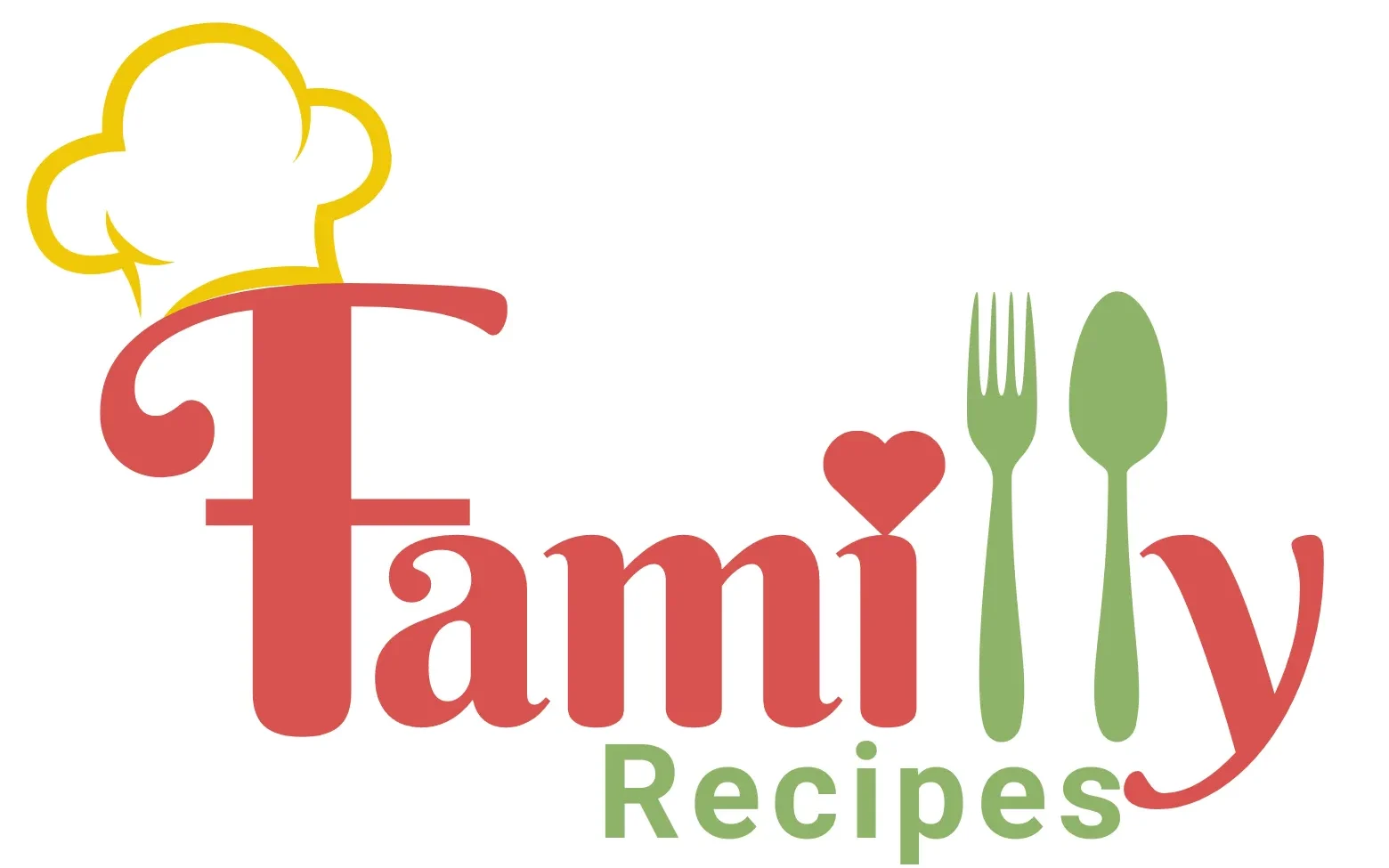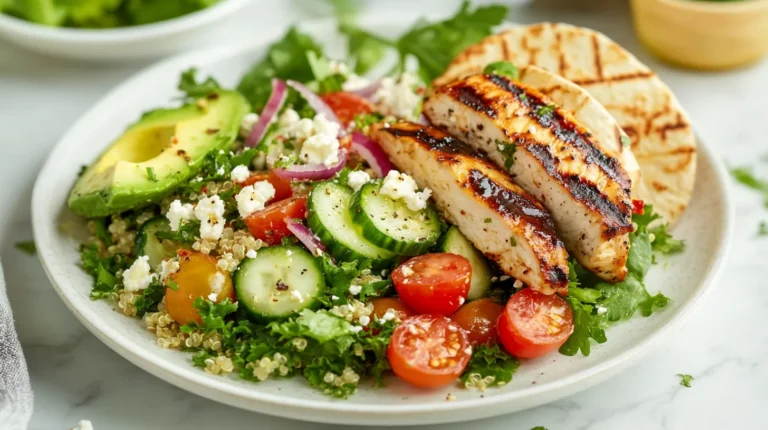
Managing chronic diseases requires a combination of lifestyle changes, including a well-balanced diet. By incorporating Healthy Lunch Recipes for Chronic Disease into your daily routine, you can effectively manage conditions such as diabetes, heart disease, hypertension, and kidney disease. Eating the right foods can help reduce inflammation, stabilize blood sugar levels, and support cardiovascular health.
According to the Mayo Clinic, consuming a heart-healthy diet rich in fiber, lean protein, and healthy fats can significantly improve overall well-being. Moreover, a Mediterranean diet is known for reducing the risk of chronic diseases due to its emphasis on whole foods and good fats.
Table of Contents
Table of Contents
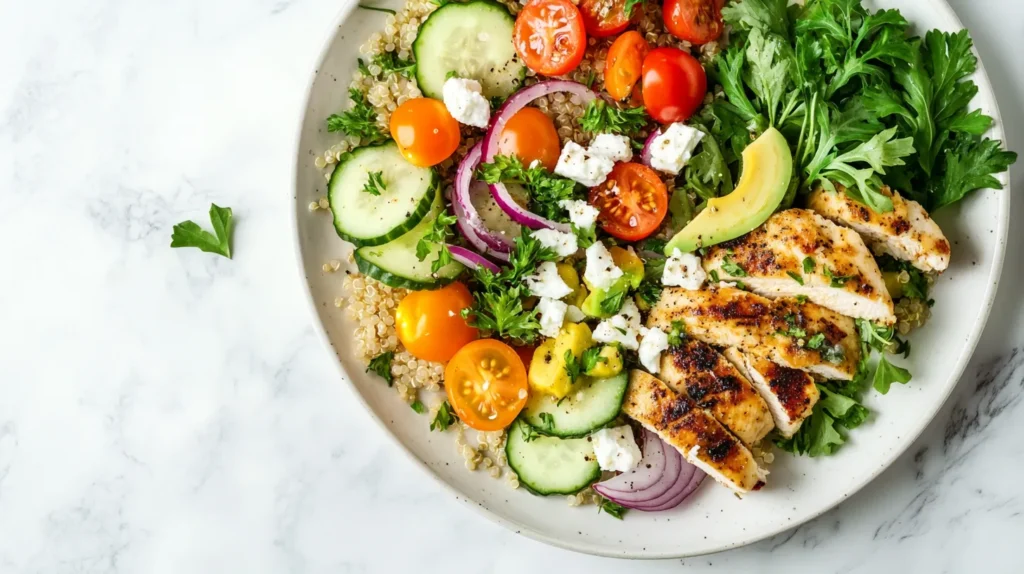
Why Healthy Lunch Recipes for Chronic Disease Matter
A well-planned Healthy Lunch Recipe for Chronic Disease plays a critical role in managing chronic conditions by ensuring a steady intake of essential nutrients while avoiding harmful ingredients. Choosing the right lunch options can make a significant difference in maintaining long-term health and preventing complications associated with diabetes, heart disease, and kidney disease.
The Importance of Healthy Lunch Recipes for Chronic Disease
- Stabilize Blood Sugar Levels – A properly balanced Healthy Lunch Recipe for Chronic Disease helps prevent blood sugar spikes that contribute to diabetes. Consuming fiber-rich foods like quinoa, legumes, and leafy greens ensures a gradual release of glucose into the bloodstream, reducing insulin resistance and improving overall blood sugar control.
- Reduce Inflammation – Chronic inflammation is linked to numerous health conditions, including heart disease and autoimmune disorders. Incorporating anti-inflammatory foods such as avocados, olive oil, and fatty fish into Healthy Lunch Recipes for Chronic Disease can help lower inflammation and support immune function.
- Improve Heart Health – Heart disease remains one of the leading causes of death worldwide. A diet rich in healthy fats, lean proteins, and whole grains is essential for lowering cholesterol levels and improving circulation. By including omega-3-rich foods such as salmon, walnuts, and flaxseeds, Healthy Lunch Recipes for Chronic Disease can contribute to overall cardiovascular health.
- Support Kidney Function – Individuals with chronic kidney disease (CKD) need to be mindful of their sodium, potassium, and phosphorus intake. A well-structured Healthy Lunch Recipe for Chronic Disease should include low-sodium, kidney-friendly foods like cauliflower, bell peppers, and lean chicken breast to help maintain balanced electrolytes and reduce strain on the kidneys.
- Provide Essential Nutrients – A nutritionally balanced Healthy Lunch Recipe for Chronic Disease supplies the vitamins, minerals, and fiber necessary to sustain energy levels, immune function, and digestive health. Incorporating a variety of colorful vegetables, whole grains, and lean proteins ensures a diverse intake of essential nutrients for long-term well-being.
Skipping meals or consuming processed foods high in refined sugars, unhealthy fats, and sodium can contribute to weight gain, nutrient deficiencies, and worsened chronic conditions. Thus, making Healthy Lunch Recipes for Chronic Disease a priority is essential for sustaining optimal health and disease management. By planning ahead and selecting nutrient-dense meals, individuals can take proactive steps toward improving their overall well-being and quality of life.ods can lead to weight gain, nutrient deficiencies, and worsened health conditions. Thus, planning balanced Healthy Lunch Recipes for Chronic Disease is crucial for long-term health.
Essential Nutrients for Healthy Lunch Recipes for Chronic Disease
1. Fiber for Heart and Gut Health
Healthy Lunch Recipes for Chronic Disease should include fiber-rich foods, which help lower cholesterol, regulate digestion, and maintain a healthy gut microbiome. Good sources include:
- Whole grains (brown rice, quinoa, oats)
- Legumes (lentils, chickpeas, black beans)
- Vegetables (broccoli, carrots, spinach)
- Fruits (apples, berries, pears)
2. Healthy Fats for Inflammation Control
Healthy fats play a vital role in reducing inflammation and supporting brain and heart health. Incorporating these fats in your chronic disease-friendly lunch can help maintain overall well-being. Sources include:
- Olive oil for dressing and cooking
- Avocados for salads and sandwiches
- Nuts and seeds (almonds, walnuts, chia seeds) for snacking and meal enhancements
- Fatty fish (salmon, mackerel, sardines) for optimal omega-3 intake
3. Lean Proteins for Muscle and Blood Sugar Control
Consuming the right proteins ensures muscle retention and better metabolic function. Opt for:
- Skinless poultry for a lean source of protein
- Eggs for an easy and nutritious meal
- Tofu and tempeh for plant-based protein alternatives
- Low-fat dairy (Greek yogurt, cottage cheese) to maintain calcium intake without excess fat
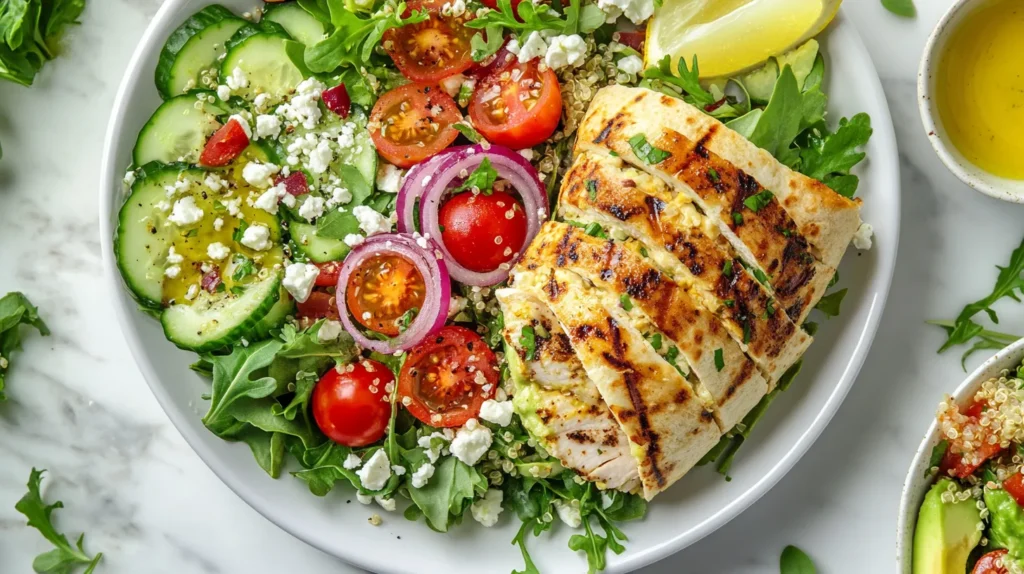
Heart-Healthy Lunch Recipes for Chronic Disease
1. Mediterranean Quinoa Salad
A perfect Healthy Lunch Recipe for Chronic Disease loaded with fiber, antioxidants, and healthy fats.
Ingredients:
- 1 cup quinoa
- 1/2 cup cherry tomatoes (halved)
- 1/2 cup cucumbers (diced)
- 1/4 cup red onions (chopped)
- 1/4 cup feta cheese
- 2 tbsp olive oil
- 1 tbsp lemon juice
- 1 tbsp fresh parsley (chopped)
Instructions:
- Cook quinoa according to package instructions and let it cool.
- In a large bowl, mix quinoa, tomatoes, cucumbers, onions, and feta cheese.
- Drizzle with olive oil and lemon juice.
- Toss well and garnish with parsley.
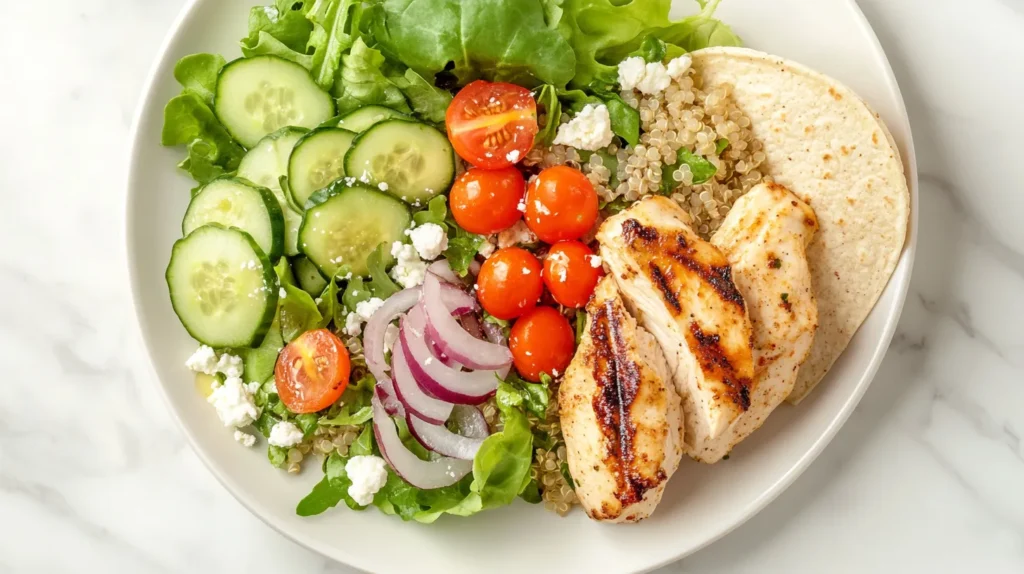
Final Thoughts
Eating the right foods can significantly impact chronic disease management. By choosing heart-healthy, diabetes-friendly, and kidney-friendly meals, you can improve your overall health.
For more meal ideas, check out our Healthy Breakfast Recipes and Low-Sodium Dinner Ideas.
FAQs on Healthy Lunch Recipes for Chronic Disease
What is the best diet for chronic disease?
The best diet for managing chronic diseases focuses on whole, nutrient-dense foods while limiting processed and inflammatory ingredients. Some of the most recommended dietary patterns include:
Mediterranean Diet – Rich in healthy fats, fiber, lean proteins, and antioxidants from foods like olive oil, fish, nuts, fruits, and vegetables.
DASH Diet (Dietary Approaches to Stop Hypertension) – Focuses on reducing sodium intake while incorporating potassium-rich foods, lean proteins, whole grains, and dairy.
Plant-Based Diet – Emphasizes vegetables, legumes, whole grains, and nuts while minimizing processed meats and unhealthy fats.
Low-Glycemic Index Diet – Beneficial for diabetes management by focusing on slow-digesting carbohydrates, such as quinoa, legumes, and non-starchy vegetables.
Avoiding excess sugar, refined grains, and unhealthy fats is essential for managing conditions like diabetes, heart disease, and hypertension.
What is a good lunch for someone with chronic kidney disease?
A kidney-friendly lunch should be low in sodium, phosphorus, and potassium while ensuring adequate protein intake. Some excellent lunch options include:
Grilled Chicken Salad with Olive Oil Dressing – Served with lettuce, cucumbers, bell peppers, and low-sodium dressing.
Rice and Stir-Fried Vegetables – Using low-potassium vegetables like green beans, cabbage, and bell peppers.
Egg Salad on Whole Wheat Bread – Low in phosphorus and provides healthy protein options.
Quinoa with Roasted Vegetables – A high-protein grain alternative with mild seasoning.
It’s crucial to stay hydrated and limit high-potassium foods like bananas, tomatoes, potatoes, and oranges when managing kidney disease.
What is the healthiest lunch you can eat?
The healthiest lunch balances protein, fiber, healthy fats, and essential nutrients to support long-term wellness. A few of the best options include:
Grilled Salmon with Quinoa and Steamed Broccoli – Packed with omega-3s, fiber, and lean protein.
Mediterranean Chickpea Salad – A mix of chickpeas, cucumbers, cherry tomatoes, and olive oil.
Avocado Toast with Poached Eggs and Spinach – A heart-healthy meal rich in healthy fats and vitamins.
Grilled Chicken and Hummus Wrap – Served in a whole wheat tortilla with greens and tahini dressing.
How do you cook with chronic illness?
Cooking with chronic illness requires planning and energy-saving techniques to make meal preparation easier. Here are some practical tips:
Meal Prep in Batches – Cook large portions of healthy grains, proteins, and vegetables in advance to reduce daily effort.
Use Simple, Nutrient-Dense Ingredients – Focus on whole, unprocessed foods that require minimal preparation.
Opt for Slow Cooker or Instant Pot Meals – These reduce standing and cooking time, making meal prep easier.
Choose One-Pan or Sheet-Pan Meals – Saves time and energy by cooking everything together in a single pan.
Keep Healthy Snacks Available – Nuts, yogurt, and fruit require little to no preparation.
Listening to your body and adjusting meal prep techniques to fit energy levels and mobility can make cooking more manageable with chronic illness.
